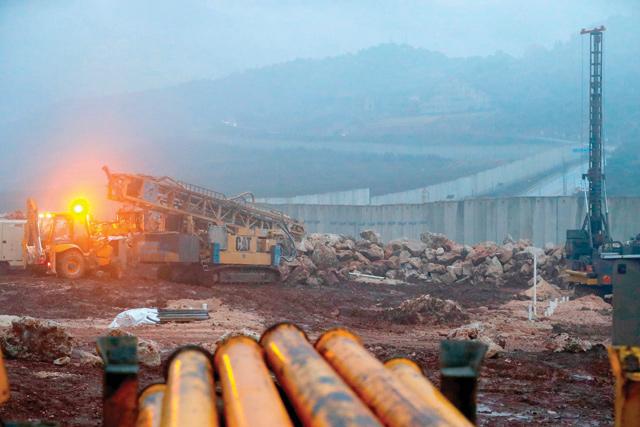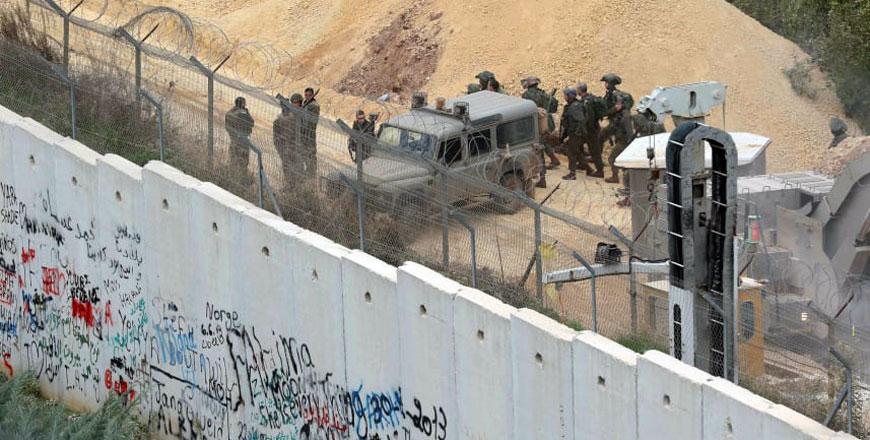You are here
Israel launches operation ‘to destroy Hizbollah tunnels’
By AFP - Dec 05,2018 - Last updated at Dec 05,2018

This photo, taken on Tuesday near the northern Israeli town of Misgav Am, shows Israeli machinery operating (right) near the border wall with Lebanon (AFP photo)
OCCUPIED JERUSALEM — Israel’s forces said Tuesday they have discovered Hizbollah tunnels infiltrating its territory from Lebanon and launched an operation to destroy them, a move likely to raise tensions with the Iran-backed group.
The surprise announcement came hours after Israeli Prime Minister Benjamin Netanyahu met with US Secretary of State Mike Pompeo in Brussels over regional dangers, with both having repeatedly warned about the activities of Iran, Israel’s main enemy.
Netanyahu said he discussed the operation with Pompeo and called the tunnels a violation of a UN truce resolution that ended a 2006 war between Israel and the Shiite group Hizbollah.
“Whoever tries to harm Israel’s security will pay dearly,” Netanyahu said in a statement.
US President Donald Trump’s White House gave its full backing to the operation, with National Security Adviser John Bolton saying “we call on Iran and all of its agents to stop their regional aggression and provocation”.
Hizbollah did not comment in detail but published footage of Israeli soldiers across the border and described the activity as aimed at “discovering tunnels allegedly from southern Lebanon to settlements in northern occupied Palestine”.
Israeli forces spokesman Lieutenant Colonel Jonathan Conricus said the “attack tunnels” were not yet operational. He declined to say how many had been detected or how they would be destroyed.
The military later specified it had located one such tunnel dug from a home in the Kafr Kila area of south Lebanon that crossed into Israeli territory and was working to “neutralise” it.
The tunnel runs some 200 metres, at a depth of 25 metres, Conricus said, and stretches some 40 metres into Israel.
The area around the Israeli town of Metula has been declared a closed military zone, with the army distributing images of heavy machinery digging into the ground.
Israel labelled the operation “Northern Shield” and said all its activities would take place inside Israeli territory. No tunnels from Lebanon include exit points within Israel, the forces said.
A UN peacekeeping force which monitors the border region said it had increased patrols but noted the area remained calm.
Lebanon’s army also said it was monitoring the situation closely.
According to Conricus, the tunnels were part of a Hizbollah plan from 2012 to “shift the battlefield to Israel” and “conquer the Galilee” in a future conflict by infiltrating its territory.
In 2013, Israeli forces acted on reports that Hizbollah was digging tunnels, but failed to locate any, he said.
Following the 2014 war between Israel and Gaza, in which the Palestinian Islamist movement Hamas used cross-border attack tunnels, the forces said they found “Hizbollah and Hamas share knowledge” and soon after began intensive work to prevent tunnels from Lebanon.
The military has used various means to collapse or fill in tunnels from the Gaza Strip.
Conricus said that while the forces have boosted their presence in the north for the Lebanon operation, they have not summoned reserve soldiers.
He said the military “holds the Lebanese government responsible for all activities perpetrated in Lebanon towards Israel”.
‘Irresponsible’
Netanyahu has spoken of a sensitive security situation without providing details, particularly after defence minister Avigdor Lieberman quit over a controversial Gaza ceasefire last month.
Lieberman’s resignation threatened to provoke early elections, but Netanyahu has held his coalition together and is clinging to a one-seat majority in parliament.
The prime minister, who has since assumed the role of defence minister, said at the time that holding elections would be “irresponsible” due to the undefined security threats.
His comments were seen by some as an attempt to save his government, with polls showing wide disapproval among the Israeli public of his handling of a Gaza flare-up in November.
Netanyahu is also facing further political pressure after Israeli forces on Sunday recommended he and his wife Sara be indicted for bribery, the third such recommendation against the premier in recent months.
Conricus rejected suggestions of politics influencing the announcement.
Netanyahu has pledged to stop Iran from entrenching itself militarily in Syria and to keep it from transferring advanced weapons to its ally Hizbollah in Lebanon.
Israel has carried out hundreds of air strikes in Syria against what it says are Iranian military targets and deliveries of advanced arms to Hizbollah.
However, a friendly fire incident in Syria in September that led to the downing of a Russian plane by Syrian air defences during an Israeli strike has complicated Israeli operations.
Russia subsequently upgraded Syrian air defences with the delivery of the advanced S-300 system.
Related Articles
OCCUPIED JERUSALEM — Israeli opposition leader Tzipi Livni accused Prime Minister Benjamin Netanyahu on Wednesday of over-dramatising the ar
OCCUPIED JERUSALEM — Israel acknowledged on Sunday that it carried out a weekend air strike on what it called an Iranian arms cache in Syria
OCCUPIED JERUSALEM — Israel told Lebanon’s army and UN peacekeepers on Thursday to destroy an attack tunnel it said had been dug by the Iran

















